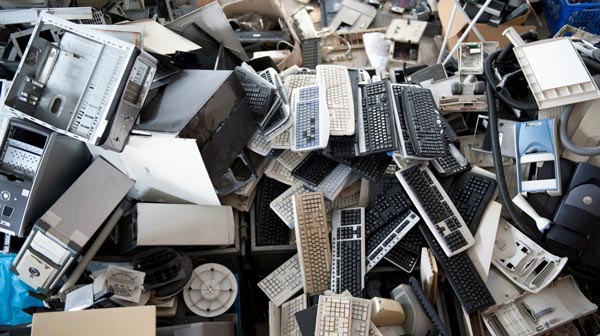Elevate Your E-Waste Monitoring With R2 Certification: an Extensive Summary
One trick method to raise e-waste monitoring methods is by acquiring R2 certification. By exploring the processes and benefits linked with R2 qualification, a deeper understanding of how it can reinvent e-waste monitoring methods arises, dropping light on a path in the direction of sustainability and moral disposal methods.
Value of E-Waste Monitoring

When e-waste is not taken care of appropriately, these hazardous substances can permeate into the ecosystem, creating injury to wild animals and potentially going into the food chain, posing dangers to human wellness. The improper disposal of e-waste adds to pollution and greenhouse gas exhausts, intensifying climate modification and environmental deterioration.

Advantages of R2 Certification

First of all, R2 certification enhances trustworthiness by showcasing an organization's commitment to sustainable methods. It ensures clients, partners, and stakeholders that the firm complies with strict criteria for e-waste monitoring - r2 certification. This reputation can cause raised trust fund and boosted relationships with clients that prioritize environmental duty
Second of all, R2 certification helps reduce dangers related to inappropriate e-waste disposal. By following the strict guidelines stated by the qualification, companies can decrease the likelihood of data breaches, ecological contamination, and legal effects. This positive method safeguards the business's reputation and minimizes prospective responsibilities.
Lastly, R2 certification shows a dedication to environmental stewardship - r2 certification. By properly managing digital waste via licensed processes, organizations contribute to the preservation of resources, decrease of contamination, and promotion of a round economic situation. This dedication not only profits the setting but likewise aligns with advancing customer assumptions for sustainable company methods
R2 Certification Process Review
Having established the benefits of R2 accreditation in promoting reliability, danger reduction, and ecological stewardship, it is necessary to now lay out the comprehensive procedure involved in obtaining this certification. The R2 accreditation procedure begins with a detailed testimonial of the organization's operational plans and treatments to make certain compliance with the R2 standard. This preliminary assessment is essential in recognizing any type of voids that require to be addressed before continuing better.
As soon as the company's methods line up with the R2 typical demands, an independent third-party auditor performs an on-site audit to examine the application and efficiency of these practices. This audit includes a thorough review of paperwork, meetings with staff, and physical evaluations of centers to verify compliance.
Complying with an effective audit, the organization obtains a qualification decision based on the auditor's searchings for. If authorized, the organization is approved R2 qualification, showing its dedication to liable e-waste monitoring. It is necessary to note that preserving R2 qualification requires ongoing compliance with the criterion's requirements and routine audits to guarantee continued adherence to best techniques in e-waste recycling and disposal.
Trick Criteria for R2 Compliance
A vital facet of attaining R2 compliance is ensuring that all digital waste (e-waste) handling centers meet stringent environmental and safety requirements. To follow R2 requirements, companies should why not look here stick to crucial requirements that concentrate on accountable e-waste management practices. These requirements include executing a recorded ecological, health, and security administration system, making sure the safe handling of data-containing devices, and performing complete downstream due diligence to track the last destination of e-waste products.
Additionally, R2 conformity requires the correct testing, refurbishment, and recycling of digital equipment to prolong its valuable life and decrease ecological impact. Facilities looking for R2 qualification need to additionally prioritize employee health and wellness by supplying required training, individual protective devices, and a risk-free working setting. Furthermore, preserving detailed documents of e-waste processing tasks and consistently undergoing audits by accredited accrediting bodies are crucial components of showing continuous compliance with R2 requirements.
Effects of Lasting E-Waste Practices
The application of lasting e-waste practices based on R2 compliance not just guarantees ecological and safety requirements are satisfied but additionally dramatically impacts the overall lifecycle of digital items. By adhering to R2 requirements, electronic waste monitoring procedures end up being a lot more effective, minimizing the ecological impact of digital products. Sustainable e-waste practices help with the appropriate disposal of digital components, making certain that hazardous products are handled responsibly and do not wind up contaminating the atmosphere.
Furthermore, sustainable e-waste practices can add to job development in the recycling and refurbishment industries, promoting financial growth while advertising environmental duty. Overall, the fostering of lasting e-waste practices under R2 accreditation offers as an important action towards achieving a more environmentally lasting electronics industry.
Final Thought
Finally, implementing appropriate e-waste management techniques his explanation is critical for environmental sustainability and resource preservation. R2 certification plays a key duty in making certain responsible handling and disposal of electronic waste. By sticking to the strict requirements set forth by R2 requirements, companies can not only minimize their environmental effect but additionally add to an extra lasting future for generations ahead.
One key technique to elevate e-waste administration methods is by acquiring R2 qualification. By checking out the benefits and procedures linked Visit Website with R2 certification, a much deeper understanding of how it can transform e-waste management techniques arises, dropping light on a path in the direction of sustainability and moral disposal techniques.
The R2 certification process starts with a complete evaluation of the company's operational policies and procedures to guarantee compliance with the R2 requirement. If approved, the organization is approved R2 certification, showing its commitment to liable e-waste monitoring. Overall, the fostering of sustainable e-waste practices under R2 qualification offers as a crucial action in the direction of achieving an extra environmentally lasting electronic devices industry.
Comments on “Eco-Friendly Electronic Devices Recycling Solutions: Trust Fund the R2 Certification Standard”